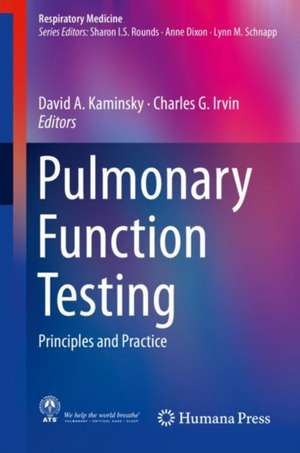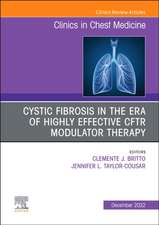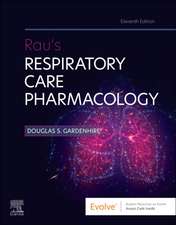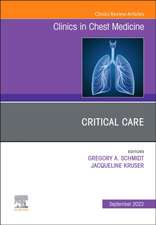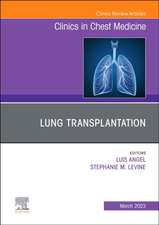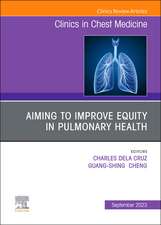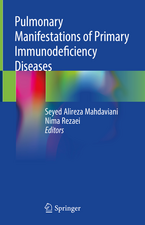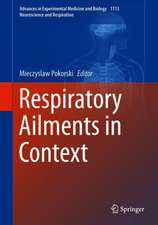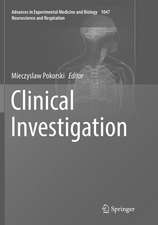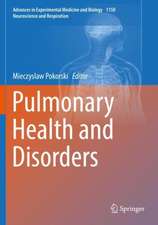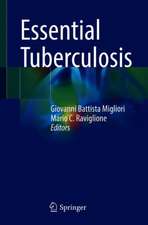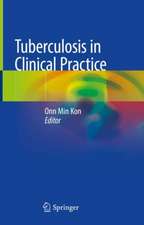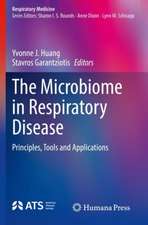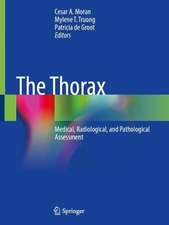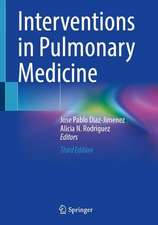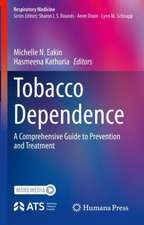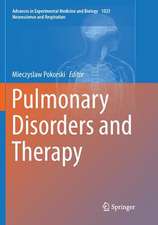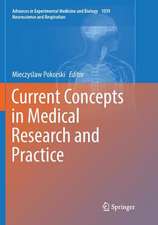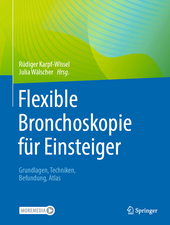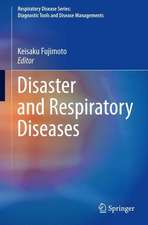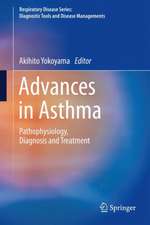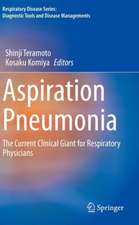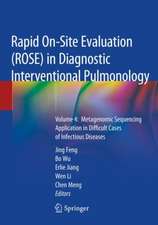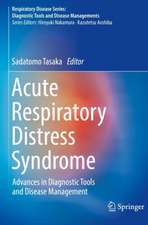Pulmonary Function Testing: Principles and Practice: Respiratory Medicine
Editat de David A. Kaminsky, Charles G. Irvinen Limba Engleză Hardback – 18 oct 2018
This book answers that need by providing a series of chapters that guide the reader in a natural order of learning about the respiratory system. In particular, after a generaloverview of the structure-function design of the lung and the history of pulmonary function testing, authors begin with the drive to breathe, and then follow the pathway of air as it is drawn into the lung, undergoes gas exchange, and is then exhaled back out again. Each chapter focuses on the key principles and corresponding pulmonary function tests that explain each step in this pathway. Each chapter is written by at least two experts, one with expertise in the underlying physiology, and the other with expertise in the clinical testing and application of pulmonary function testing in practice. Many figures and tables highlight key points, and multiple case studies in each section provide specific examples of the clinical application of each pulmonary function test.This is an ideal guide to pulmonary function tests for practicing pulmonologists, residents, fellows, and medical students.
| Toate formatele și edițiile | Preț | Express |
|---|---|---|
| Paperback (1) | 665.00 lei 38-44 zile | |
| Springer International Publishing – 5 ian 2019 | 665.00 lei 38-44 zile | |
| Hardback (1) | 920.83 lei 38-44 zile | |
| Springer International Publishing – 18 oct 2018 | 920.83 lei 38-44 zile |
Din seria Respiratory Medicine
- 5%
 Preț: 910.09 lei
Preț: 910.09 lei - 5%
 Preț: 719.02 lei
Preț: 719.02 lei - 5%
 Preț: 805.89 lei
Preț: 805.89 lei - 5%
 Preț: 1111.61 lei
Preț: 1111.61 lei - 5%
 Preț: 1098.12 lei
Preț: 1098.12 lei - 5%
 Preț: 939.25 lei
Preț: 939.25 lei - 5%
 Preț: 1032.64 lei
Preț: 1032.64 lei - 5%
 Preț: 823.28 lei
Preț: 823.28 lei - 5%
 Preț: 654.11 lei
Preț: 654.11 lei - 5%
 Preț: 901.10 lei
Preț: 901.10 lei - 5%
 Preț: 719.38 lei
Preț: 719.38 lei - 5%
 Preț: 1043.97 lei
Preț: 1043.97 lei - 5%
 Preț: 778.44 lei
Preț: 778.44 lei - 5%
 Preț: 1632.41 lei
Preț: 1632.41 lei - 5%
 Preț: 718.65 lei
Preț: 718.65 lei - 5%
 Preț: 1419.39 lei
Preț: 1419.39 lei - 5%
 Preț: 781.17 lei
Preț: 781.17 lei - 5%
 Preț: 722.69 lei
Preț: 722.69 lei - 5%
 Preț: 718.46 lei
Preț: 718.46 lei - 5%
 Preț: 524.63 lei
Preț: 524.63 lei - 5%
 Preț: 1612.30 lei
Preț: 1612.30 lei - 5%
 Preț: 1101.58 lei
Preț: 1101.58 lei - 5%
 Preț: 1101.58 lei
Preț: 1101.58 lei - 5%
 Preț: 720.84 lei
Preț: 720.84 lei - 5%
 Preț: 779.16 lei
Preț: 779.16 lei - 5%
 Preț: 1417.29 lei
Preț: 1417.29 lei - 5%
 Preț: 1100.30 lei
Preț: 1100.30 lei - 5%
 Preț: 989.22 lei
Preț: 989.22 lei - 5%
 Preț: 780.45 lei
Preț: 780.45 lei - 5%
 Preț: 853.05 lei
Preț: 853.05 lei - 5%
 Preț: 1621.44 lei
Preț: 1621.44 lei - 5%
 Preț: 1042.69 lei
Preț: 1042.69 lei - 5%
 Preț: 721.77 lei
Preț: 721.77 lei - 5%
 Preț: 1601.52 lei
Preț: 1601.52 lei - 5%
 Preț: 370.21 lei
Preț: 370.21 lei - 5%
 Preț: 1108.87 lei
Preț: 1108.87 lei - 5%
 Preț: 1030.17 lei
Preț: 1030.17 lei - 5%
 Preț: 1302.37 lei
Preț: 1302.37 lei - 5%
 Preț: 1296.68 lei
Preț: 1296.68 lei - 5%
 Preț: 781.17 lei
Preț: 781.17 lei - 5%
 Preț: 1167.58 lei
Preț: 1167.58 lei - 5%
 Preț: 851.05 lei
Preț: 851.05 lei
Preț: 920.83 lei
Preț vechi: 969.30 lei
-5% Nou
Puncte Express: 1381
Preț estimativ în valută:
176.21€ • 185.29$ • 145.59£
176.21€ • 185.29$ • 145.59£
Carte tipărită la comandă
Livrare economică 12-18 aprilie
Preluare comenzi: 021 569.72.76
Specificații
ISBN-13: 9783319941585
ISBN-10: 3319941585
Pagini: 325
Ilustrații: XIV, 318 p. 92 illus., 56 illus. in color.
Dimensiuni: 155 x 235 x 16 mm
Greutate: 0.77 kg
Ediția:1st ed. 2018
Editura: Springer International Publishing
Colecția Humana
Seria Respiratory Medicine
Locul publicării:Cham, Switzerland
ISBN-10: 3319941585
Pagini: 325
Ilustrații: XIV, 318 p. 92 illus., 56 illus. in color.
Dimensiuni: 155 x 235 x 16 mm
Greutate: 0.77 kg
Ediția:1st ed. 2018
Editura: Springer International Publishing
Colecția Humana
Seria Respiratory Medicine
Locul publicării:Cham, Switzerland
Cuprins
Introduction to the Structure and Function of the Lung.- The History of Pulmonary Function Testing.- Initiating the Breath.- Breathing In.- Distribution of Air.- Gas Exchange.- Breathing Out.- Breathing in and Out.- Bronchial Responsiveness.- Field Exercise Testing.- Integrating the Whole: Cardiopulmonary Exercise Testing.- Special Considerations for Pediatric Patients.- Reference Equations.- Managing the Pulmonary Function Lab.- Appendix: Formulas, Reference Equations.
Notă biografică
David A. Kaminsky, MD is a Professor of Medicine in the Division of Pulmonary and Critical Care at the University of Vermont. He is a prolific writer and speaker in pulmonary medicine and has won many teaching and mentorship awards over the course of his career.
Charles G. Irvin, PhD is a Professor of Medicine and Molecular Physiology and Biophysics at the University of Vermont, as well as Director of the Vermont Lung Center. He has served on the editorial boards of several journals in pulmonology and has published extensively.
The editors, Drs. Kaminsky and Irvin, have a long track record of teaching pulmonary physiology and pulmonary function testing to medical students, residents, fellows and graduate students, with over 50 years of combined experience.
Charles G. Irvin, PhD is a Professor of Medicine and Molecular Physiology and Biophysics at the University of Vermont, as well as Director of the Vermont Lung Center. He has served on the editorial boards of several journals in pulmonology and has published extensively.
The editors, Drs. Kaminsky and Irvin, have a long track record of teaching pulmonary physiology and pulmonary function testing to medical students, residents, fellows and graduate students, with over 50 years of combined experience.
Textul de pe ultima copertă
This book serves as a unique, comprehensive resource for physicians and scientists training in pulmonary medicine and learning about pulmonary function testing. Pulmonary function testing and the physiological principles that underlie it are often poorly understood by medical students, residents, fellows and graduate students training in the medical sciences. One reason is that students tend to get overwhelmed by the basic mathematical descriptions that explain the working of the respiratory system and the principles of pulmonary function testing. Another reason is that too many approaches focus on the math without explaining the clinical relevance of these principles and the laboratory testing that enables us to measure the very lung function that these principles are describing.
This book answers that need by providing a series of chapters that guide the reader in a natural order of learning about the respiratory system. In particular, after a general overview of the structure-function design of the lung and the history of pulmonary function testing, authors begin with the drive to breathe, and then follow the pathway of air as it is drawn into the lung, undergoes gas exchange, and is then exhaled back out again. Each chapter focuses on the key principles and corresponding pulmonary function tests that explain each step in this pathway. Each chapter will be written by at least two experts, one with expertise in the underlying physiology, and the other with expertise in the clinical testing and application of pulmonary function testing in practice. Many figures and tables highlight key points, and multiple case studies in each section provide specific examples of the clinical application of each pulmonary function test.This is an ideal guide to pulmonary function tests for practicing pulmonologists, residents, fellows, and medical students.
This book answers that need by providing a series of chapters that guide the reader in a natural order of learning about the respiratory system. In particular, after a general overview of the structure-function design of the lung and the history of pulmonary function testing, authors begin with the drive to breathe, and then follow the pathway of air as it is drawn into the lung, undergoes gas exchange, and is then exhaled back out again. Each chapter focuses on the key principles and corresponding pulmonary function tests that explain each step in this pathway. Each chapter will be written by at least two experts, one with expertise in the underlying physiology, and the other with expertise in the clinical testing and application of pulmonary function testing in practice. Many figures and tables highlight key points, and multiple case studies in each section provide specific examples of the clinical application of each pulmonary function test.This is an ideal guide to pulmonary function tests for practicing pulmonologists, residents, fellows, and medical students.
Caracteristici
Offers integration of physiology and practice for pulmonary function tests Presents clear explanation of rationale for and interpretations of pulmonary function tests Includes multiple case studies to better elucidate the decisions and results described
